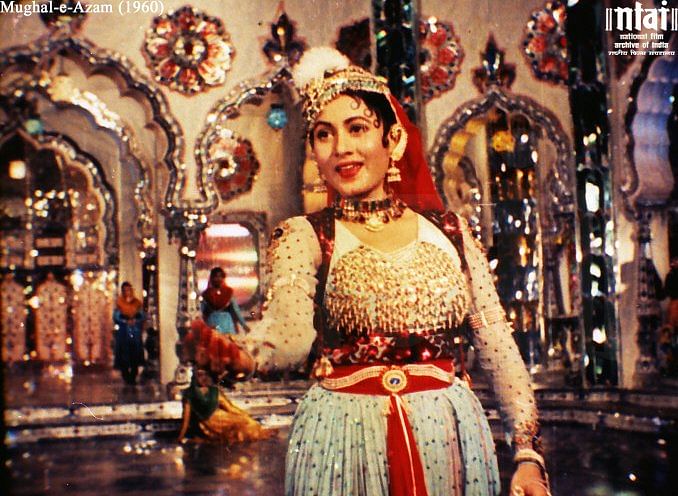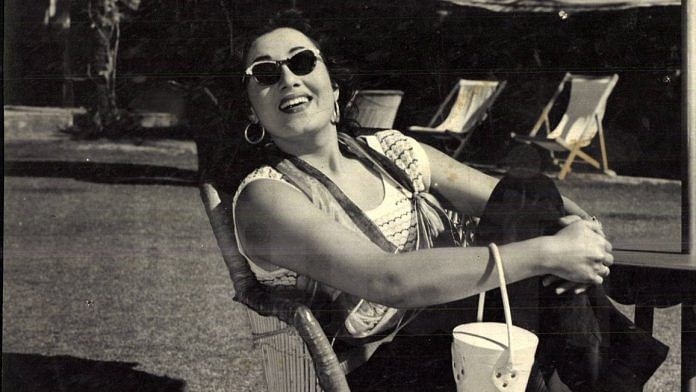Even half a century after her death, Madhubala, among India’s most legendary and celebrated actors, continues to live in our contemporary conscience. She remains the hallmark of beauty and sensuousness, having left nothing unmoved since she began her career as an actor.
In 1952, Theatre Arts, a US-based magazine named her the “biggest star in the world”, and described her as a phenomenon of her own: “The story of India for the past ten years,” it wrote, could be told in a few words, “the war, the movie boom, independence, and Madhubala.”
It’s not without irony, then, that an actor of such versatility — whose bewilderment in the serious Amar (1954) could effortlessly transition to comic playfulness in Chalti Ka Naam Gaadi (1958) — is almost typecast as a tragic beauty in the wake of her death. This was typified in her role as Anarkali in K. Asif’s magnum opus Mughal-e-Azam (1960), which, released nine years before she died, came to define her life and legacy.
On her 50th death anniversary today, ThePrint remembers the iconic actor.
‘Happiness comes first’
It’s not as if Madhubala’s life wasn’t tragic or that she wasn’t beautiful. She was reticent and stunning, the perfect cocktail to inspire awe and a kind of voyeurism that grips anyone whose gaze happens to fall upon her. Her quiet existence — never attending public functions, rarely giving interviews, maintaining a stringent sense of punctuality and fastidiousness to her craft — made her all the more bewitching. Her premature death at age 36 served to further exalt her to the status of a goddess, paralleled only by Marilyn Monroe.
“To be beautiful means a lot to me,” Khatija Akbar, her biographer, quotes her as once saying in the book I Want to Live: The Story of Madhubala.
“But not everything. Happiness comes first.”
And happiness for Madhu, as she was fondly called by her colleagues, was work. In the 22 years she spent in the show business, she acted in 70 films.
“People tell me I ought to get married,” she reportedly said in 1954. “But I am too busy right now, too much in love with my work.”

Despite this, public acknowledgment for her skill has always been an afterthought. She never won an award, not even for Mughal-e-Azam.
Also Read: Zeenat Aman, diva who dared Bollywood conventions on screen but believed in them off it
Growing up
Madhubala, born Mumtaz Jehan Begum Dehlavi in 1933, was cast in her first movie aged 9, in the critically-acclaimed Basant (1942). Born into an impoverished Pashtun family, the burden of earning an income lay with ‘Baby Mumtaz’ as she was then known. It was on the sets of Basant that she was christened Madhubala, or “honey belle”, by actor Devika Rani, who produced the film.
Madhubala had made a formidable name for herself after the release of Mahal in 1949. Between Neel Kamal (1947), where she played Raj Kapoor’s love interest, and Mahal, she acted in 12 other films, driven by the need to keep her family afloat. She was 16.
Her dedication to her craft, however, cannot go without mention of her father, who is said to have shaped so much of her life.
Ataullah Khan is often vilified as the man who thwarted his daughter’s iconic romance with actor Dilip Kumar — the love of her life for nine years. Given her profession, his restrictions were often thought of as unreasonable: He is held responsible for disallowing her from shooting outside, or going out in the evenings.
Yet Madhubala’s fierce sense of independence is impossible to ignore. She learned to drive without her father’s knowledge when she was 12, and taught herself English at 17. On set, she wooed and flirted with whomever she pleased, and that too with a true sense of abandon, never once caring about the reputation it might earn her.
Men and Mughal-e-Azam
Madhubala’s performance in Mughal-e-Azam has left an indelible mark on Indian cinema. Akbar writes in her biography that denying Madhubala the award for best actress “cost the Filmfare awards their credibility in what was one of their worst gaffes ever”.
It also resembled the arc of her love affair with Dilip Kumar, her co-star. The film, which took nearly a decade to produce, saw the beginning of their romance which drove fans nothing short of mad.
Also read:Parveen Babi put sex-appeal in 1970s Bollywood, but constantly fought mental health issues
Their performances would never have betrayed that things went sour over the nearly decade-long production. By the time they shot one of Indian cinema’s most iconic (and erotic) scenes — where he brushes a feather across her face and leans in for a kiss — they weren’t on talking terms.
Between her lover, her eventual husband Kishore Kumar, and her looming father, Madhubala’s fate as a figure of loss was sealed, burgeoned by her early death.
Privacy
Given the popular narrative, it’s important to note heartbreak wasn’t the cause of Madhubala’s early demise: Not even her sister Madhur remembers her as depressed or unhappy. What caused it was a hole in the heart, diagnosed in 1954, for which at the time there was no cure.
In fact the title of Akbar’s book — something Madhubala told her sister before she passed away — is testament to her will to live and work. As her health began to decline, she told her sister, “No sooner had I learned what I was doing, god said enough.”
Why then, with knowledge of her impending death, did Madhubala remain so inaccessible to a world that only loved her? For one, she was genuinely afraid of overwhelming crowds and attention. Her sisters remember her driving them to get ice cream dressed in a burqa so she wasn’t recognised.
Even writings of hers — if any — are impossible to find. Akbar, rather ironically, finds that this is because she feared committing to any version of herself.
“I have got into the habit of not saying things rather than saying them and later suffering the added agony of having misrepresented myself,” Akbar quotes her as having said.
The irony is baffling. Madhubala’s reclusiveness has inspired all kinds of wild rumours — one, published in an ‘unofficial biography’ after her death, claims Kishore Kumar kept her shackled like Anarkali in Mughal-e-Azam.
In refusing to write a self-portrait, she once told Filmfare magazine:
“…it is only then, when you have learned to forget yourself and everything that concerns you, that you can act well…You will lie, you will paint a character about yourself and call it you. But I will not do that because I think a self portrait is an inner picture of yourself, and in my case it has no face, no figure that can be painted on paper.”
Also read: When Kishore Kumar spoke to Pritish Nandy about Bombay, Hitchcock and his many wives




You write or utter the name MADHUBALA and you are in FAIRY LAND. YES she was a fairy and her ETHEREAL and ETERNAL BEAUTY is joy for ever